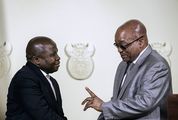DUTCH Prime Minister Mark Rutte shortened his recent trade visit to SA following the carnage by Islamic State terrorists in Paris. He led a delegation of 75 companies from the Netherlands in sectors including water, agriprocessing, horticulture, health and logistics.
About 350 Dutch companies in SA employ about 10,000 people, and trade between the two countries has risen from R27bn in 2010 to R48bn last year.
Welcoming the delegation, President Jacob Zuma said the Dutch people had "stood with the oppressed people of SA during a most difficult period in our history. The Netherlands became a powerful centre of the anti-apartheid movement during the struggle for liberation."
But this history did not stop his government from unilaterally cancelling bilateral investment treaties — meant to protect foreign investors — with 13 of the wealthiest European Union (EU) member states including the Netherlands. The government has retained similar treaties with China, Russia, Iran and Cuba.
Existing investments with "former" EU partners will remain protected for between 10 and 20 years. They are being phased out with the implementation of the state’s Promotion and Protection of Investment Bill.
Parliament passed the bill last week despite opposition, especially over clauses scrapping international arbitration of trade and investment disputes. It will now go to the National Council of Provinces for assent.
...
THE legislation gives the government what it calls "the right to regulate". But foreign investors want more investment security, including against black economic empowerment (BEE) and possible expropriation.
Trade and Industry Minister Rob Davies has stated that the bill will create a comprehensive, uniform legal framework to govern foreign investment. This will enable the government to remedy socioeconomic wrongs stemming from apartheid, and to include the majority of South Africans in the broader economy.
The Department of Trade and Industry has also acknowledged that there is little in the bill that promotes investment, and has agreed to remove the word "promotion" from its title and objectives.
The EU is by far SA’s largest trade and investment partner, with annual bilateral trade worth more than R400bn. The Netherlands is SA’s eighth-largest trading partner. The country will assume the presidency of the EU next year.
Ahead of his visit, Rutte was asked for his view on the investment bill. He said it was "crucial" for a new agreement to be reached with SA, preferably through the EU.
The Financial Times reported that global development campaigners claim that some multinational companies, such as cigarette manufacturers, are exploiting bilateral investment treaties to circumvent national regulations and bully countries.
Law firm Norton Rose Fulbright reports that Indonesia intends to terminate more than 60 bilateral investment treaties.
Several Latin American countries have announced their withdrawal from the International Centre for Settlement of Investment Disputes, an international arbitration institution.
Peter Leon, partner at law firm Webber Wentzel, says that far from clarifying and modernising SA’s legal framework for investment protection, the Promotion and Protection of Investment Bill "is extremely vague and is intrinsically incompatible with modern international investment law" — including the Southern African Development Community (Sadc) protocol on trade.
From 1994 to 2009, SA signed 45 bilateral investment treaties and ratified 22 of them. In 2006, it signed the SADC protocol on finance and investment, which offers bilateral investment treaty-style protection to foreign investors.
"The bill domesticates international investment protection at a time when the trend, globally, is the internationalisation of such protection. It effectively repudiates the Sadc protocol," Leon says.
"I do not accept that (SA’s) government cannot pursue legitimate BEE goals under the existing bilateral investment treaties, as a number of the later ones contain a BEE public policy exception for the promotion of BEE," he says.
"For example, the Iran-SA bilateral investment treaty contains a broad exception for the promotion of BEE which would not prevent SA from following programmes of economic redress. The simple answer would have been to request the amendment of the earlier bilateral international treaties, which do not contain such an exception."
...
LEON says that none of the major objections to the investment bill were accepted by the African National Congress majority in the trade and industry portfolio committee, "in particular the absence of investor-state dispute resolution".
He adds that the provision of discretionary state-state dispute resolution "is essentially meaningless and takes SA back to a 19th-century era of diplomatic protection".
"The Department of Trade and Industry’s argument that this is consistent with developments in the (proposed) EU-US Transatlantic Trade and Investment Partnership is fallacious, as the EU has proposed the establishment of an investment court modelled on the World Trade Organisation’s dispute settlement system, rather than the wholesale abolition of investor-state dispute resolution," Leon says.
"By not renegotiating the bilateral investment treaties, the department has effectively scored an own goal owing to the long-survival clauses of the terminated treaties. This means that the protection in these treaties survives for between 10 and 20 years, thus exposing SA to investment treaty claims for a considerably long period."
Law firm Cliffe Dekker Hofmeyr says that despite "significant amendments" to the investment bill, it still "contains serious concerns for foreign investors, specifically from the European business community for the lack of a number of international investment law protection measures to encourage future trade and investment in SA".
SA and the Netherlands signed new memorandums of understanding for economic co-operation during Rutte’s shortened visit.
President Jacob Zuma welcomes Dutch Prime Minister Mark Rutte during recent trade talks. The new Promotion and Protection of Investment Bill will see foreign investors enjoying less protection in SA, which critics have said could deter future trade. Picture: KOPANO TLAPE
DUTCH Prime Minister Mark Rutte shortened his recent trade visit to SA following the carnage by Islamic State terrorists in Paris. He led a delegation of 75 companies from the Netherlands in sectors including water, agriprocessing, horticulture, health and logistics.
About 350 Dutch companies in SA employ about 10,000 people, and trade between the two countries has risen from R27bn in 2010 to R48bn last year.
Welcoming the delegation, President Jacob Zuma said the Dutch people had "stood with the oppressed people of SA during a most difficult period in our history. The Netherlands became a powerful centre of the anti-apartheid movement during the struggle for liberation."
But this history did not stop his government from unilaterally cancelling bilateral investment treaties — meant to protect foreign investors — with 13 of the wealthiest European Union (EU) member states including the Netherlands. The government has retained similar treaties with China, Russia, Iran and Cuba.
Existing investments with "former" EU partners will remain protected for between 10 and 20 years. They are being phased out with the implementation of the state’s Promotion and Protection of Investment Bill.
Parliament passed the bill last week despite opposition, especially over clauses scrapping international arbitration of trade and investment disputes. It will now go to the National Council of Provinces for assent.
...
THE legislation gives the government what it calls "the right to regulate". But foreign investors want more investment security, including against black economic empowerment (BEE) and possible expropriation.
Trade and Industry Minister Rob Davies has stated that the bill will create a comprehensive, uniform legal framework to govern foreign investment. This will enable the government to remedy socioeconomic wrongs stemming from apartheid, and to include the majority of South Africans in the broader economy.
The Department of Trade and Industry has also acknowledged that there is little in the bill that promotes investment, and has agreed to remove the word "promotion" from its title and objectives.
The EU is by far SA’s largest trade and investment partner, with annual bilateral trade worth more than R400bn. The Netherlands is SA’s eighth-largest trading partner. The country will assume the presidency of the EU next year.
Ahead of his visit, Rutte was asked for his view on the investment bill. He said it was "crucial" for a new agreement to be reached with SA, preferably through the EU.
The Financial Times reported that global development campaigners claim that some multinational companies, such as cigarette manufacturers, are exploiting bilateral investment treaties to circumvent national regulations and bully countries.
Law firm Norton Rose Fulbright reports that Indonesia intends to terminate more than 60 bilateral investment treaties.
Several Latin American countries have announced their withdrawal from the International Centre for Settlement of Investment Disputes, an international arbitration institution.
Peter Leon, partner at law firm Webber Wentzel, says that far from clarifying and modernising SA’s legal framework for investment protection, the Promotion and Protection of Investment Bill "is extremely vague and is intrinsically incompatible with modern international investment law" — including the Southern African Development Community (Sadc) protocol on trade.
From 1994 to 2009, SA signed 45 bilateral investment treaties and ratified 22 of them. In 2006, it signed the SADC protocol on finance and investment, which offers bilateral investment treaty-style protection to foreign investors.
"The bill domesticates international investment protection at a time when the trend, globally, is the internationalisation of such protection. It effectively repudiates the Sadc protocol," Leon says.
"I do not accept that (SA’s) government cannot pursue legitimate BEE goals under the existing bilateral investment treaties, as a number of the later ones contain a BEE public policy exception for the promotion of BEE," he says.
"For example, the Iran-SA bilateral investment treaty contains a broad exception for the promotion of BEE which would not prevent SA from following programmes of economic redress. The simple answer would have been to request the amendment of the earlier bilateral international treaties, which do not contain such an exception."
...
LEON says that none of the major objections to the investment bill were accepted by the African National Congress majority in the trade and industry portfolio committee, "in particular the absence of investor-state dispute resolution".
He adds that the provision of discretionary state-state dispute resolution "is essentially meaningless and takes SA back to a 19th-century era of diplomatic protection".
"The Department of Trade and Industry’s argument that this is consistent with developments in the (proposed) EU-US Transatlantic Trade and Investment Partnership is fallacious, as the EU has proposed the establishment of an investment court modelled on the World Trade Organisation’s dispute settlement system, rather than the wholesale abolition of investor-state dispute resolution," Leon says.
"By not renegotiating the bilateral investment treaties, the department has effectively scored an own goal owing to the long-survival clauses of the terminated treaties. This means that the protection in these treaties survives for between 10 and 20 years, thus exposing SA to investment treaty claims for a considerably long period."
Law firm Cliffe Dekker Hofmeyr says that despite "significant amendments" to the investment bill, it still "contains serious concerns for foreign investors, specifically from the European business community for the lack of a number of international investment law protection measures to encourage future trade and investment in SA".
SA and the Netherlands signed new memorandums of understanding for economic co-operation during Rutte’s shortened visit.



























Change: -1.87%
Change: -1.56%
Change: -5.10%
Change: -0.75%
Change: -0.06%
Data supplied by Profile Data
Change: 0.00%
Change: 0.00%
Change: -1.87%
Change: 0.00%
Change: 0.00%
Data supplied by Profile Data
Change: 0.07%
Change: -0.05%
Change: -0.01%
Change: 3.31%
Change: 0.00%
Data supplied by Profile Data
Change: 0.00%
Change: 0.00%
Change: 0.00%
Change: 0.00%
Change: 0.00%
Data supplied by Profile Data